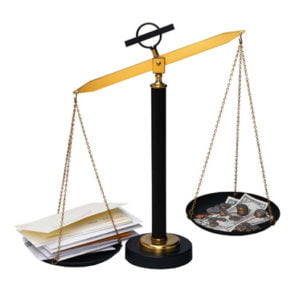Chapter 7 vs. Chapter 13 Bankruptcy

If you are considering filing bankruptcy, it can be difficult to know which chapter to choose: Chapter 7 vs. Chapter 13. Bankruptcy can be daunting, and the process often seems complex. There are eligibility requirements to consider, as well as a different timeline for each chapter. It’s best to seek the assistance of an experienced Dallas bankruptcy lawyer. Call Allmand Law Firm, PLLC today at 214-974-3278 to learn about your options. We can help you determine which chapter of bankruptcy best suits your situation.
What Are the Benefits of Filing Bankruptcy?
Bankruptcy is a legal process that can help you manage your debts when they become overwhelming. You may be able to completely eliminate or restructure your debt so that it is easier to pay. Filing bankruptcy can also stop legal procedures such as repossession of your car or foreclosure on your house. Creditor harassment will also be stopped through the bankruptcy process.
Although you may be aware that bankruptcy is a logical choice for you, you may be unsure of whether to choose Chapter 7 vs. Chapter 13. A skilled attorney can help you understand the difference and start the legal process for you.
What Is Chapter 7 Bankruptcy?
Often called “liquidation bankruptcy,” Chapter 7 bankruptcy eliminates most of your debt quickly and efficiently. Unsecured debts, such as credit cards and medical bills, may be discharged completely. Secured debt, such as car loans and mortgages, may either be eliminated through liquidation of that property and payment to the creditor, or reaffirmed so you can keep your belongings.
You must qualify for Chapter 7 bankruptcy through a Means Test. The test will determine if your income is low enough and you have little or no disposable funds. If you make too much money, you may not qualify for Chapter 7.
You may be considering Chapter 7 vs. Chapter 13 and be unsure of which is right for you. Consider the following reasons that you might choose Chapter 7 bankruptcy:
- You do not have enough income to repay your debts.
- You need to quickly manage your debts.
- Most of your debt can be discharged through bankruptcy.
If you would rather get out of debt quickly and start rebuilding right away, Chapter 7 may be right for you. By discussing your specific situation with a skilled Chapter 7 vs. Chapter 13 bankruptcy attorney, you can find out which options are in your best interests.
What Is Chapter 13 Bankruptcy?

Chapter 13 is often called “reorganization bankruptcy.” It allows debtors to develop a manageable repayment plan for debts so that they can retain their personal property while paying it off. Repayment plans often allow the debtor to reduce interest rates and eliminate late fees and penalties that may have been applied to past due accounts.
When considering qualification for Chapter 7 vs. Chapter 13, it’s important to know that Chapter 13 does not require proof of eligibility through a Means Test. However, you must be able to show that you have sufficient income to repay your debts through a repayment plan.
If you are unsure about whether Chapter 7 vs. Chapter 13 is right for you, consider the following reasons to file for Chapter 13 bankruptcy. You:
- Do not qualify to file for Chapter 7 through the Means Test.
- Want to repay your debts over time.
- Want to keep your nonexempt property.
- Would like to completely avoid foreclosure or repossession of your property.
- Have debts that cannot be discharged through Chapter 7.
- Have a codebtor or someone who has signed loans with you.
Chapter 13 will give you an option to restructure your debt into a manageable payment plan that you can repay over time. Instead of dealing with the situation quickly over the course of a few months, such as with Chapter 7, you can discuss options with creditors and retain your property as you repay them over a three to five year period.
How Long Does Chapter 7 vs. Chapter 13 Bankruptcy Take?
The timelines associated with Chapter 7 vs. Chapter 13 differ greatly. Because Chapter 7 basically eliminates all debt quickly, it can take between four and six months after you file the case. However, Chapter 13 requires completion of payments over a three to five year time period. Thus, your bankruptcy will be complete in a much shorter time period with Chapter 7; however, Chapter 13 may allow you to retain more of your personal property.
The Bankruptcy Process: Chapter 7 vs. Chapter 13
The bankruptcy process is similar between Chapter 7 vs. Chapter 13. You must take the following steps for both types of bankruptcy:
- Take a credit counseling course within 180 days before filing bankruptcy
- File a bankruptcy petition in federal court
- Submit information about your debts, assets, income, and expenses
- Attend a 341 Meeting of Creditorswith your attorney between 20 and 40 days after you file bankruptcy
- Complete secondary counseling within 45 days after the Meeting of Creditors
The major difference is that you will have to qualify for Chapter 7 through a Means Test, and you will have to show proof of sufficient income through a payment plan for Chapter 13. At the end of the bankruptcy process, your remaining debt will be discharged for both Chapter 7 and Chapter 13.
Differences Between Chapter 7 vs. Chapter 13
 While both Chapter 7 and Chapter 13 bankruptcy can help you manage your debt and regain control of your financial future, the two bankruptcy chapters function differently. Some of the key differences between Chapter 7 vs. Chapter 13 include the process and characteristics of each.
While both Chapter 7 and Chapter 13 bankruptcy can help you manage your debt and regain control of your financial future, the two bankruptcy chapters function differently. Some of the key differences between Chapter 7 vs. Chapter 13 include the process and characteristics of each.
Who Can File Chapter 7 vs. Chapter 13?
While individuals may file for either Chapter 7 or Chapter 13, businesses can only use Chapter 7. A sole proprietor operating a business with their own name connected to business debt may use Chapter 13. However, a business other than a sole proprietorship may not use Chapter 13.
Eligibility Differences Between Chapter 7 and Chapter 13
In order to qualify for Chapter 7 bankruptcy, you must qualify using a Means Test. Although there is no means test for Chapter 13, you still must qualify according to the amount and type of debt that you have. In order to file Chapter 13, you cannot have more than $394,725 of unsecured debt or $1,184,200 of secured debt. If you do not qualify for either Chapter 7 nor Chapter 13, you may have to use another type of bankruptcy, such as Chapter 11.
How Long Does It Take: Chapter 7 vs. Chapter 13
One of the biggest differences between Chapter 7 and Chapter 13 is the length of time it takes to conclude the bankruptcy. Chapter 7 is a relatively quick process and can take four to six months. However, Chapter 13 typically takes three to five years to fully complete the payment plan.
What Happens to Property?
With Chapter 7 bankruptcy, you may be forced to liquidate, or sell, all of your nonexempt property in order to pay creditors. However, you get to keep most of your property in a Chapter 13 bankruptcy and repay creditors over time.
Getting to Start Over With Chapter 7 vs. Chapter 13
While you are able to start fresh with both Chapter 7 and Chapter 13 bankruptcy, you can get a quicker start with Chapter 7. With Chapter 13, you retain many of your debts for several years and still have to pay much of them back. However, Chapter 7 immediately eliminates most of your debt and you can start over.
It can be difficult to know if Chapter 7 vs. Chapter 13 is right for you. It’s best to consider all of the pros and cons of each type of bankruptcy and ask a knowledgeable lawyer about your options. By understanding your finances and how bankruptcy will impact you over time, you can make a positive decision about which chapter will work best for you.
Contact a Bankruptcy Lawyer When Considering Chapter 7 vs. Chapter 13
When deciding between Chapter 7 vs. Chapter 13, you should evaluate the pros and cons associated with both. A skilled bankruptcy lawyer can help you understand your legal options and guide you through the process. Allmand Law Firm, PLLC has helped countless clients achieve financial security by filing bankruptcy and managing debt effectively. Call us today at 214-974-3278 for a consultation to consider your options.